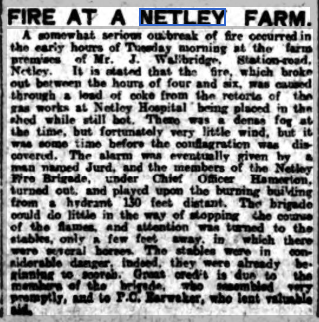Much of the information shown below has been extracted from the files of Ken Ford, author
of "Netley Village". His research is held at the History Room at Netley Station in the safe arms of Hound Local History Society who have kindly allowed me to reproduce it here.
NETLEY VOLUNTARY FIRE BRIGADE
1902 - 1943
Following on from a fire at Lancaster + Crook's premises on Station Road when the hay
and straw stores went up in smoke and Netley Hospital Fire Brigade did not arrive until the
fire had been extinguished, it was proposed at the Parish Council Meeting of 7 July 1902 that
a Netley Abbey Fire Brigade should be formed.
On 18 August, rules were formulated and 12 men became members of Netley Abbey's
Voluntary Fire Brigade -
Captain C Hamerton, C Cook, J Lacey, J Morse, L Mills, W Tee,
T H Billet (Crown + Cushion Pub), Broomfield, I Gibbons, J Cozens, H Tuckey and H Brewer.
The equipment consisted of a portable stand pipe, 1 x 3 ft 6 inches branch pipe, 1 hose reel
and 60ft of hose. Shortly after, a 500 ft hose reel and hose branch pipe with nozzle and 6
hose spanners were added.
In 1903, lamps, firemen's belts and wall plates for "Fireman" were purchased.
In 1904, further equipment consisting of 2 x 60 ft lengths of hose, spanners,
branch pipe and jet and 12 brass firemen's helmets were obtained.
In May 1905, John Hodder was appointed as "call boy" at Butlock's Heath.
He was supplied with a cape and a belt. His job presumably was to watch out
for any outbreaks of fire at Butlock's and get back to Netley (a mile or so) to raise the alarm.
We're guessing he used his own bike as there is nothing to suggest a bike was made available.

The Fire Hut on New Road, Netley Abbey was between G Young, the Cobbler and the Allotments.
There was a goal post arrangement for drying the hoses from which a large piece of iron
was hung and this was banged as loudly as possible by the first person there.
Another of the Call Boy’s duties was to cycle around the village etc notifying the firemen
that they were needed.
In 1906, it was agreed to purchase an additional hose and ladder.
The Council sanctioned the use of “visits for collection of the Christmas Box”.
The firemen were often to be seen going round the “more affluent”houses in the Village
seeking donations for their Christmas box.
In 1907, a second Call Boy was hired.
The original uniforms consisted of a brass helmet, a belt, and an axe.
The helmets only came in one size - perhaps only men with the same size of head
as the helmet got recruited?
Then when trousers were provided, they too apparently came - yes, you’ve guessed it
- only in one size! [I’m not going there.]
In March 1908, the Captain's house caught fire Luckily he knew some guys who could put it out!
On 21 March 1910, the Fire Brigade attended a fire at Lankester + Crook (predecessor to Spencer) in Station Road. People were roused from their beds to get the horses out of the stables.
It was at the Bakehouse and the hayricks (where the Central Club is now).
Fire Brigade in ca 1922 - left to right Vibert, Shipley, Edwards, Carter, Barnes,
Morse, Saville, Hamerton, Adams, Carter, Sharpe, Kill, Unknown**
**Unknown - do you recognise him? If so, please let me know!
On 23 July 1923, the Clerk reported that the Wet Drill for the purpose of testing the new hose supplied by Messrs Merryweather had not been permitted by Southampton Corporation because of the shortage of water.
There was a smaller hut behind the Fire Hut on New Road which on occasion had been used as a mortuary. In June 1928, Hound Parish Council was looking for alternative locations for use as a mortuary rather than one of the local public houses -
In January 1932, it was reported that £18 0s 6d had been subscribed to the
Fire Brigade’s Christmas Box.
During the last year of the Voluntary Fire Brigade, each man received 30/-d and 15/-d to
the Call Boys. At the local Parish Council meeting, Mr T S Phipps made each man’s
money up to £2 and Mr Lowe up to £2.10s.
In 1934, Mr Sharp advised that there was a need to reach outlying places quicker.
The current method of transport was “man-hauling”, trundling the equipment
through the streets on a cart.
In February 1935, the Southampton Town Clerk advised that the Borough Fire Brigade would
from now on attend to outbreaks in the outlying district.
On the passing of the 1938 Fire Brigade Act, Winchester Rural District Council took
over all the equipment and the shed still being used on New Road.
A new Brigade was formed, consisting of 6 men, later to be increased to 8 men
with 2 probationers. Mr Sharp now became Deputy Chief Officer.
They were enrolled in November 1938 -
A E Sharp, Deputy Chief Officer, 4 Sellwood Road, Netley Abbey;
E Collins, Audrey Cottage, Station Road, Netley Abbey;
E Perry, 43 Victoria Road, Netley Abbey;
H Bowyer, “The Ferns”, New Road, Netley Abbey;
W Carter, 56 Hunt Avenue, Netley Abbey;
A Edwards, 35 Denzil Avenue, Netley Abbey;
H Lowe, Victoria Club, Netley Abbey;
J Meikle,”Trafalgar”, New Road, Netley Abbey.
In May 1939, under the watchful eye of Mr D Harris Chief Officer, they were measured
for their new uniforms.
Clearly "one size fits all" was a thing of the past!
In June 1939, a Bedford Tender fitted with first aid was delivered.
It was housed in Mr Orman’s Garage pendng erection of a new Station.
In January 1940, the Home Office supplied a Worthington-Simpson Trailer Pump and
a 28 hp Wyllis Knight car was purchased and an AFS Brigade was formed
with 12 men, fully equipped.
The new Fire Station on New Road, almost opposite the Police Station was completed
on 25 June 1940. See map below.
The Bedford Tender and Apex Trailer Pump were installed on the same day.
Two sheds were erected in July with the Worthington-Simpson Trailer Pump and
Wyllis Knight car being installed.
Some of the fires reported in the Brigade's Minutes:
January 1940 - there was a fire at "Niton", Denzil Avenue, Netley -
Nightingale Inn reported a fire in the kitchen stove. It was smothered with sand.
On 01/12/1940, the Fire Brigade were called out to deal with 32 incendiary bombs
which had landed on the Castle Grounds.
On 06/12/1940, there was a Fire call to 32 Denzil Avenue’s chimney.
The hearth was on fire but the grate was raked out and left safe.
On 15/12/1940, there was a Fire Call to “The Nook” Hound Road, Netley Abbey.
The kitchen was burnt out but the rest of the house was saved.
On 12/03/1941 0130h, 5 bombs dropped in the Village, one of which demolished
“The Hermitage” on Grange Road, sadly killing Mrs Ellen Pyke.
[The information I have been told was that Mrs Pyke led her Staff to the safety of the house basement when the siren sounded but sadly soon after, she returned upstairs to retrieve her purse
just as the bomb hit the house.]
The remains of Mrs Ellen Pyke, 84, were interred on Friday 14/03/1941 at the Roman Catholic Burial Place, Bursledon, Father Haines conducting the service.
The family mourners were Mrs Ensell and Mrs V Hammick (daughters), Major Pyke (son),
The Rev C Ensell (son-in-law).
Mrs Pyke was a well-known figure in the village and often visited those in need, giving
cheery words and helpful comfort.
Hampshire Telegraph 21/03/1941
On Friday, 14/03/1941 at 2300h, fire bombs were dropped on Netley Common causing
a quarter of a mile of fire surrounding houses. All houses were saved.
Happier Times!
On 14/04/1941, D Wozencroft was married at St Edward’s Church, Netley Abbey.
The Bedford and Wylls Tender was used to bring the Wedding Party from the
Church to Jubilee Hall.
15 Firemen attended the Service and formed an archway of fire axes.
R Schofield was married at Weston Church on 24/05/1941. 11 Firemen attended
with the Bedford Tender and formed an archway with fire axes.
The St Valentine Dance held in the Central Club and organised by the Netley Fire Service Social Club
yielded £12 for the Aid-to-Russia Fund.
A dozen boxes of matches were auctioned and realised 6s 3d and a collection taken
amounted to £1 12s. The spot prizes were all given.
Hampshire Telegraph 27/02/1942
Farewell to Netley Voluntary Fire Brigade
In December 1943, the Parish Council discussed the possibility of retaining the
Fire Brigade (and Ambulance) after the War.
In 1945, however, Winchester Rural District Council decided to remove the Fire Brigade
from Netley so the Parish Council could use the building as the Library.
On 6 May 1949, the new Library in the former Fire Station was opened.
Unfortunately the building had structural issues, subsidence occurred and the Library had to be removed.
The Jubilee Hall took over the role of a Library for some years.
When Netley Infants' School closed in 1984, the Library opened in that building and is still there today.













